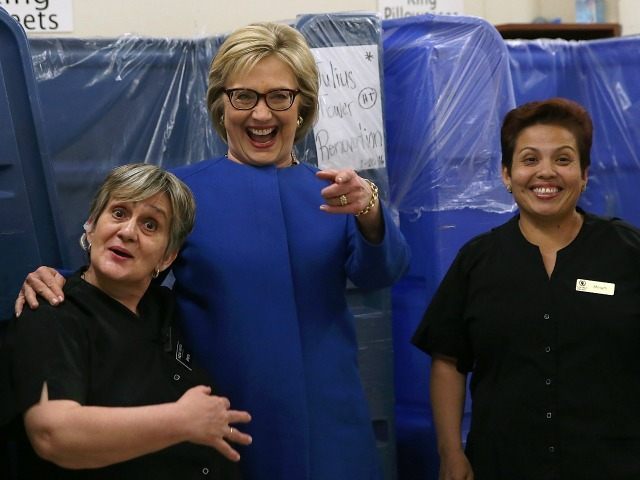Democratic presidential candidate Hillary Clinton will return this weekend to the site of the bitter 2008 Nevada caucus, where she and Barack Obama fought for every vote amid lawsuits, charges of cheating, and alleged voter intimidation.
Clinton won that vote in Nevada–but Obama grabbed a greater number of convention delegates because of Nevada’s vote-counting rules.
Now she is back in Nevada, where she and Sen. Bernie Sanders (I-VT) loyalists will go to almost any length to ensure their candidates gain the upper hand in Saturday’s vote-count.
The two candidates are neck-and-neck. Sanders lost the Iowa caucuses by two-tenths of one percentage point, won big in New Hampshire, now has a razor-thin lead in Nevada, and has for the first time gained a three-point lead nationally.
In 2008, Clinton won the Latino vote by a 3-to-1 margin and beat Obama among female voters, as well. This time, she still has the backing of women in this race, although in Nevada, the Latino Democratic voters are split evenly–including many unionized hotel workers–between her and Sanders.
Younger millennials mostly back Sanders, while the older population–their parents–mostly support Clinton.
Media reports from 2008 showed the fervor that she is likely to experience again. Partisans said Obama’s supporters upturned a wheelchair-bound woman who wanted to caucus for Clinton, flushed Clinton ballots down the toilet, and told union members they could only vote if their names were on the list of Obama supporters. Other reports said people working for the controversial ACORN group repeatedly registered voters in the name of “Mickey Mouse” and registered the entire starting lineup of the Dallas Cowboys twice: once in Nevada and again in Minnesota.
After her victory, Obama did not congratulate Clinton in his statement. Instead, he lauded his own efforts and said:
We ran an honest, uplifting campaign in Nevada that focused on the real problems Americans are facing, a campaign that appealed to people’s hopes instead of their fears. That’s the campaign we’ll take to South Carolina and across America in the weeks to come.
Meanwhile, his campaign manager, David Plouffe, reportedly issued a written statement blaming the loss on “an entire week’s worth of false, divisive attacks designed to mislead caucus-goers and discredit the caucus itself” from the Clinton camp.
Clinton’s allies had objected to polling sites which were to be set up at several casinos on the Las Vegas Strip to allow shift-workers, whose commutes were otherwise difficult, to participate in the Saturday caucuses. Two days after Obama received the endorsement of the Las Vegas’ Culinary Union Local 266, lawyers for the Nevada State Education Association had filed a federal lawsuit challenging the voting system, an apparent attempt to kill the nine additional caucuses that were set up on the Strip itself to help the union workers vote.
Bill Clinton had even accused the Culinary Union of strong-arming and pressuring many of its members to back Obama. Unite Here, the Culinary Union’s parent union, ran a radio ad accusing Clinton’s allies of attempting to block Hispanic workers’ voting rights. Despite all of this, ABC News noted that workers at the Bellagio Hotel held up signs reading, “I support my union. I support Hillary.”
Hispanics reportedly made up 14 percent of Democratic caucus-goers in Nevada and overwhelmingly supported Clinton. She received 64 percent support from Hispanics, and Obama received just 26 percent. While Clinton touted the endorsements of Ugly Betty star America Ferrera and Los Angeles Mayor Antonio Villaraigosa, Obama brandished the support of the Culinary Union, which was 40 percent Hispanic and had 60,000 members at the time.
Today, the Culinary Union has refused to endorse either Clinton or Sanders.
D. Taylor, who headed the union at the time, told The New York Times that the 2008 fight was one of the most intense he had witnessed. “That was a very polarizing election, and we’ve learned lessons from that,” he said, regarding the decision not to get involved this time. “We are heading into our [wage] negotiations now and we want to be very unified dealing with the companies, and we don’t want anything polarizing our members.”
Follow Adelle Nazarian on Twitter @AdelleNaz.

COMMENTS
Please let us know if you're having issues with commenting.